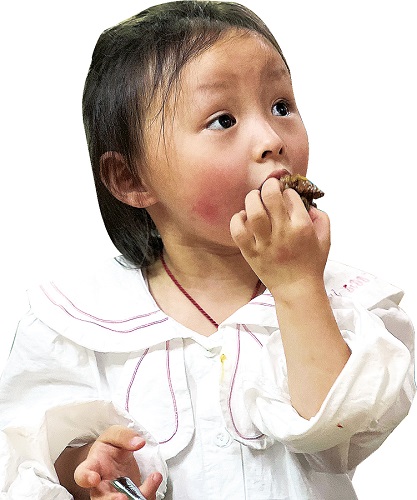Nutrition project gives rural kids enough food for thought
Students' growth boosted by school meals that use local produce, help create jobs


From farm to plate
Peng Jianghua usually gets a call from headmaster Peng Nangui at night, asking for a chicken or duck for the children's lunch the next day. The following morning, she brings along a fowl when she drops her 6-year-old daughter at the kindergarten.
The mother has been supplying meat to the kindergarten for five years. She has over 100 chickens and ducks, and feeds them corn and grains, but never commercial feed.
The garden by the kindergarten entrance is tended to by 68-year-old caretaker Li Hongnian, whose grandson attends the school. Every morning, he picks the freshest vegetables from the garden and delivers them to the kindergarten. He never uses chemical fertilizers or pesticides.
As relatives of the students, Li and Peng have been selected to provide healthy ingredients for the children's meals. The project requests participating preschools use at least 30 percent of their subsidies to purchase produce from smallholder farmers at market prices.
"To supply produce to the kindergarten, being a close relative of a student is a must," said Zhang Ye, deputy director of the prefecture's foreign investment and aid project affairs center, who has followed the program since 2018. "This way, we ensure food safety and help parents with jobs and extra income," Zhang added.
The nutrition program tries to involve the poorest and most disadvantaged parents, especially those with limited market access. The project also focuses on supporting women. Every year, each household receives 500 yuan worth of seeds and organic fertilizer, and undergoes at least two training sessions to improve their farming skills. This has helped expand and improve the variety and quality of meat and vegetables on children's plates.
Before joining the program, Peng Jianghua worked in a shoe factory in East China's Zhejiang province and only traveled home for the Chinese New Year. She felt a deep sadness about her struggle to connect with her 15-year-old son, a left-behind child. Finding work at home was tough, and her son was raised by his grandparents.
After returning home in 2017 to give birth to a daughter, her desire to stay and support her children grew stronger. By supplying chickens and ducks to her daughter's preschool, she not only earns income of about 6,000 yuan per year but also gets to stay with her children.
"I could earn more working away," Peng Jianghua said, "but I'd rather stay home."
Grandpa Li no longer has to make long trips to the market or spend the whole day selling his produce. He said it saves him a lot of time, allowing him to focus on other farm work or just relax.
Sometimes, local government cafeterias also purchase surplus produce from the smallholder farmers, boosting their income.
"The project fits seamlessly with China's past poverty reduction efforts and the current push for rural revitalization," said Zhao, from the WFP China Office.























